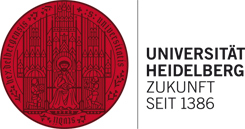Heidelberg University Is Again Successful in the German Excellence Initiative

Ruperto Carola is one of eleven German universities whose institutional strategies were successful in the second funding round of the German Excellence Initiative, allowing them to claim the title of an "elite university". After its success in the first funding phase, Heidelberg is one of only six universities whose institutional strategy gained a positive evaluation and whose renewal application was also successful. The university's two clusters of excellence and three graduate schools will also be funded for another five years. Within the framework of the Excellence Initiative, Heidelberg University is increasingly focusing on promoting internationality and the professional exchange with visiting scientists.
The decision in the second phase of the Excellence Initiative – a project with which the German federal government and states want to sustainably promote Germany as a research location – was made on 15 June 2012. In the first funding phase (2006/2007), Heidelberg University had already presented convincing concepts in all three funding lines: institutional strategy (long-term development of the university as a whole), clusters of excellence (research of a group of related subjects) and graduate schools (support of PhD students in a wide range of subjects). The clusters of excellence "Cellular Networks" and "Asia and Europe in a Global Context" and the graduate schools for fundamental physics (HGSFP), mathematical and computational methods for the sciences (HGS MathComp) and molecular and cellular biology (HBIGS) will all be able to continue their work with funding from the Excellence Initiative in the second funding phase from 2012 through 2017.

The university's institutional strategy "Heidelberg: Realising the Potential of a Comprehensive University", which will be continued with a refined set of objectives, centres on the dialogue across traditional subject boundaries. New forms of interdisciplinary cooperation are to be continued and enhanced. At the core of the Heidelberg research strategy are four large, interactive fields of research: "Molecular and cellular basis of life", "Structure and pattern formation in the material world", Cultural dynamics in globalised worlds" and "Self-regulation and regulation: individuals and organisations". In addition to other institutions, the Marsilius Kolleg will contribute greatly toward promoting research-related exchange between the humanities, law and the social sciences on the one hand, and the natural and life sciences on the other.
Heidelberg University traditionally maintains close ties with international scientific networks. The university went to great lengths to promote internationalisation in the first phase of the Excellence Initiative; this international exchange will be further intensified in the second phase. The aim is not only to further develop international collaborations, but also to support and foster internationality in Heidelberg: Ruperto Carola wants to significantly increase the number of foreign researchers and academic teachers of all qualification levels on the Heidelberg campus.
This strategy is supported by several tools:
- The university makes a point of supporting networking among junior research groups (bilateral and multilateral). This is an important tool to gain scientific expertise and to promote the global exchange of information between junior research groups.
- The first phase of the Excellence Initiative saw the introduction of a global mobility programme that awards short-term scholarships to PhD students and postdocs of Heidelberg University. The purpose of the programme is to initiate new and intensify existing collaborations. It focuses on long-term cooperation with renowned international partners and research networks.
- The Joint Appointment Programme is designed to bring outstanding international scientists to Heidelberg University. They are invited to teach and conduct research at Heidelberg University in recurrent cycles of three to six months, providing a valuable addition to research and research-based teaching. In the second phase of the Excellence Initiative, the programme will be extended by a special programme for visiting professors and fellows. These positions will be the subject of a university-wide call for proposals, in which faculties and institutes may submit suggestions for suitable visiting scientists.
- In the second phase of the Excellence Initiative, the Marsilius Kolleg – a central measure of the university's institutional strategy – will introduce Marsilius visiting professors as a measure of internationalisation. The Marsilius Kolleg was founded in 2007 in the first phase of the initiative with the aim of promoting a dialogue between different scientific cultures (e.g. the humanities and the natural sciences) and initiating interdisciplinary research projects. At the heart of the Marsilius Kolleg are the Marsilius Fellows: Scientists of Heidelberg University and of regional, non-university research institutions may apply for a one-year fellowship. The second phase of the Excellence Initiative gives Marsilius Fellows the chance to apply for additional funding in order to invite international scientists to come to Heidelberg for up to six months as Marsilius visiting professors.
- All visiting scientists are supported by the university's Welcome Centre that was founded in 2009. The centre is among the winners of the competition of the Alexander von Humboldt Foundation. In the course of the Excellence Initiative II, the centre will extend its range of services and open branches on all three campuses (Old Town, Bergheim, Neuenheimer Feld) to improve availability.
- The number of study programmes conducted largely in English , especially at the graduate level, will be increased. The exchange between pre- and post-graduates will be promoted in cooperation with the international partner universities. The university also plans to offer more graduate programmes abroad; there are currently eight study programmes at the Centre of Excellence in Santiago de Chile and at the Ecole du Louvre in Paris (art history).
- Recruit and Retain: Heidelberg University will increase its efforts to recruit foreign scientists in order to enhance its international orientation.

